
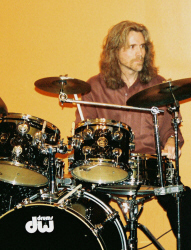 David Jennings |
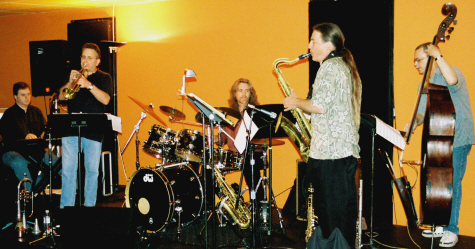 David Jennings Acoustic Ensemble |
|
Story and Photos by Brad Walseth Not unlike the rise of indie rock that kicked some life into a moribund musical form, there seems to be a resurgence of energy occurring in the world of jazz music. Thanks to the development of computer-based compositional software, new, affordable digital recording, and the ability of the internet to transmit original music without having to go through mainstream channels of distribution, talented independent jazz artists are now taking advantage of their opportunities to write, produce and market their compositions to the world. Often, these composers would be unable to get their music through to the public by conventional means, where the tone-deaf accountants in power seek to pigeonhole music into set genre, safe commercial music, or simply follow in the crest of the latest wave in popular music. David Jennings and his Acoustic Ensemble are a perfect example of a group that would be hard-pressed to secure a spot on a conservative major label because they don't play standards or smooth jazz, and the music is both original and (thankfully) difficult to label. In short, Jennings and band represent all that is exciting and wonderful about the brave new world of "indie jazz," as their exuberant appearance up the staircase and behind the white door at Elastic Arts Friday clearly demonstrated. Often, these composers would be unable to get their music through to the public by conventional means, where the tone-deaf accountants in power seek to pigeonhole music into set genre, safe commercial music, or simply follow in the crest of the latest wave in popular music. David Jennings and his Acoustic Ensemble are a perfect example of a group that would be hard-pressed to secure a spot on a conservative major label because they don't play standards or smooth jazz, and the music is both original and (thankfully) difficult to label. In short, Jennings and band represent all that is exciting and wonderful about the brave new world of "indie jazz," as their exuberant appearance up the staircase and behind the white door at Elastic Arts Friday clearly demonstrated.Starting off with a burning "Turnabout," from their debut recording Eternity (click here to read our review), Jennings and company served notice that this would be a memorable evening for attendees at the Milwaukee Avenue performance center. The song starts off with Michael Flack's haunting piano pattern over Jennings high-hat - then the flute floats in - something that makes me gasp every time I hear it - before the bass and trumpet kick in, and that is a feature of much of Jennings' work, where the piano holds the center of the melodic structure, just as Jennings' drums center the rhythmic end. 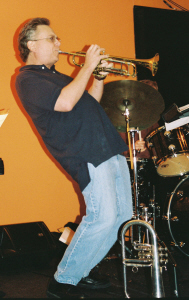 Flack admirably fills his role - not only following Jennings' arrangements, but fleshing them out with his own touches.
Flack admirably fills his role - not only following Jennings' arrangements, but fleshing them out with his own touches.A true ensemble in the sense of the word, everyone is an equal contributor to the whole. Front-line partners Dave Zielinski and Jim Peterson work together in tandem almost telepathically, helping give the music an astonishingly wide palette of sounds for a quartet. With Zielinski moving back and forth between soprano, alto, and tenor sax, and flute; and Peterson cycling through trumpet, muted trumpet and flugelhorn - the mix provides a shimmering array of colors. Nor do they simply provide shading, as they also function as primary soloists. Zielinski can burn with the best and his fiery solos served to up the crowd's excitement level; but he is equally adept at playing it soft and gentle - especially on flute. Meanwhile, Peterson plays as sweet a horn as you will hear, even when playing it "hot"; his round gleaming tones provide the perfect complement to his counterpart. The musical exchanges between these two players were simply a delight to behold. In Jennings' music, the bass player isn't simply relegated to time-keeping  (the drummer can handle that himself quite nicely, thank you), and instead is given a more prominent role in the melodic context - something that requires a player especially skilled. Fortunately, the DJAE has just such a player in Anthony Brock - whose powerful - string bending, yet harmonic solos please the ear, while at the same time warning you against shaking the fellow's hand for fear of permanent damage to the fingers. (the drummer can handle that himself quite nicely, thank you), and instead is given a more prominent role in the melodic context - something that requires a player especially skilled. Fortunately, the DJAE has just such a player in Anthony Brock - whose powerful - string bending, yet harmonic solos please the ear, while at the same time warning you against shaking the fellow's hand for fear of permanent damage to the fingers. Throughout it all, seated comfortably behind his drum kit as though he were meditating under a Bo tree, bandleader Jennings anchors the proceedings in a calm and composed manner. Although seeming to be completely at peace, the drummer is constantly in motion, busily not only leading his ensemble, but creating an incredible array of drum sounds from perhaps the best-sounding live drum kit I have ever heard. 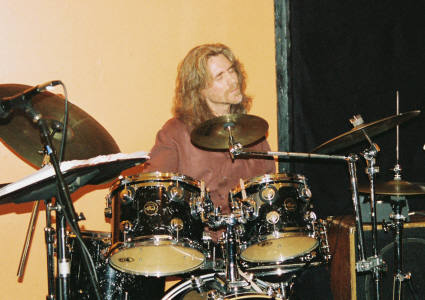 Producing an ornately intricate percussive tapestry that would make most drummers - working in tandem WITH a percussionist more than proud, Jennings does it all with a graceful fluidity and economy of motion, that seems to give proof to the belief that relaxation and peace of mind are key elements in producing results through muscular effort. Stylistically, Jennings is completely his own, and his command of his instrument and his personal form of expression results in a most pleasing "best of both worlds" - one that combines the intensive attention to every sound and pulse of a Paul Motian, with the explosive power of a Billy Cobham. In fact, I have not witnessed a drummer who can so readily move from quietude to volcanic eruption with such fervor, since attending one of Max Roach's solo concerts in the '80s - something all the more surprising considering Jennings' kind countenance and humble demeanor. The drum solos were exciting, but never excessive, while their intensity had the audience on the edge of their chairs in joy and awe. Producing an ornately intricate percussive tapestry that would make most drummers - working in tandem WITH a percussionist more than proud, Jennings does it all with a graceful fluidity and economy of motion, that seems to give proof to the belief that relaxation and peace of mind are key elements in producing results through muscular effort. Stylistically, Jennings is completely his own, and his command of his instrument and his personal form of expression results in a most pleasing "best of both worlds" - one that combines the intensive attention to every sound and pulse of a Paul Motian, with the explosive power of a Billy Cobham. In fact, I have not witnessed a drummer who can so readily move from quietude to volcanic eruption with such fervor, since attending one of Max Roach's solo concerts in the '80s - something all the more surprising considering Jennings' kind countenance and humble demeanor. The drum solos were exciting, but never excessive, while their intensity had the audience on the edge of their chairs in joy and awe.The band played through much of Eternity - great songs like "Tonacity," "My Religion," the Latin-flavored "Borrowed Time," "Dreamer," "Fire," and the title cut - which has grown on me so much over the last few days that it is my current favorite tune.  These compositions are not your run-of-the-mill, 32-bar blues numbers, but are almost symphonic in the twists and turns, sudden shifts, and false endings. The latter especially catches the listener off guard - and when the band kicks back in, always puts a smile on the face. Following the paths of the Jennings pieces can be a twisted path indeed, yet the band performed as the well-rehearsed, highly-talented professionals they are - and the arrangements were given the loving support pieces of such complexity require from all ensemble members.
These compositions are not your run-of-the-mill, 32-bar blues numbers, but are almost symphonic in the twists and turns, sudden shifts, and false endings. The latter especially catches the listener off guard - and when the band kicks back in, always puts a smile on the face. Following the paths of the Jennings pieces can be a twisted path indeed, yet the band performed as the well-rehearsed, highly-talented professionals they are - and the arrangements were given the loving support pieces of such complexity require from all ensemble members.Perhaps the most exciting part of the evening was the debut of four new numbers written by Jennings.  Despite a few nearly imperceptible rough edges, these new songs shone quite brightly, and were an indication that the DJAE has even more to offer in the future. Numbers like "Toxic Tango" and "No Words" showed even more of the Jennings propensity for springing shocks and surprises on his audience; while the delightful "Mountain Lullaby" took the band into new melodic terrain and may signal some deeper forays into more melodic directions. But it was the haunting "Song for Jacquline" that maybe made the most impression, with its haunting colors and deep emotional quality that seemed to hover palpably in the air around the band.
Despite a few nearly imperceptible rough edges, these new songs shone quite brightly, and were an indication that the DJAE has even more to offer in the future. Numbers like "Toxic Tango" and "No Words" showed even more of the Jennings propensity for springing shocks and surprises on his audience; while the delightful "Mountain Lullaby" took the band into new melodic terrain and may signal some deeper forays into more melodic directions. But it was the haunting "Song for Jacquline" that maybe made the most impression, with its haunting colors and deep emotional quality that seemed to hover palpably in the air around the band.
Jennings is an independent jazz artist who is proving that the indie jazz scene is where the great music is being made in jazz these days; and I would entreat you to check the David Jennings Acoustic Ensemble out - especially if you are tired of being force-fed bland mainstream lightweight jazz, and instead find you have a craving for adventurous, compelling, and well-played new jazz music. |
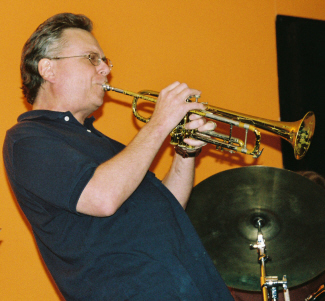 Jim Peterson |
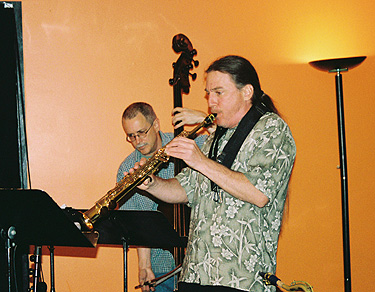 Dave Zielinski & Anthony Brock |
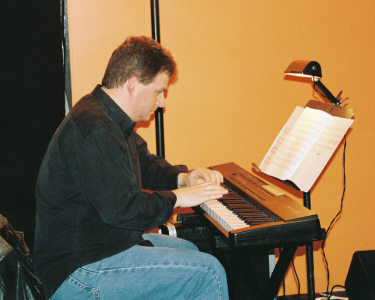 Michael Flack |
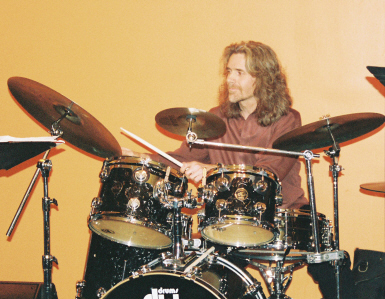 David Jennings |
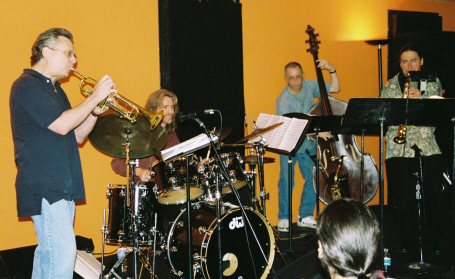 David Jennings Acoustic Ensemble |
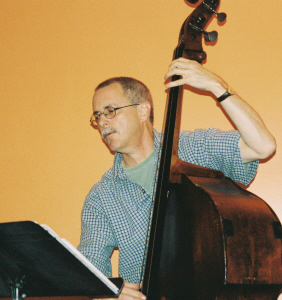 Anthony Brock |
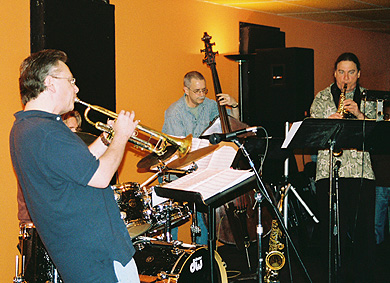 DJAE |
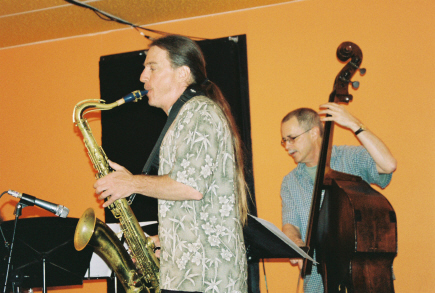 Dave Zielinski & Anthony Brock |
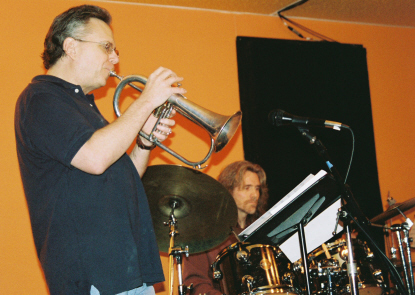 Jim Peterson & David Jennings |
 DJAE |
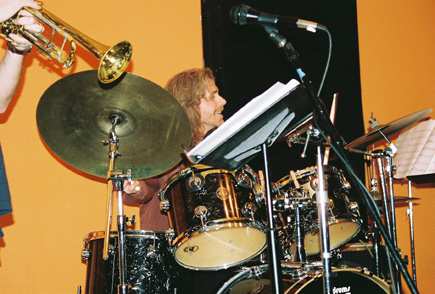 David Jennings |
 Dave Zielinski |
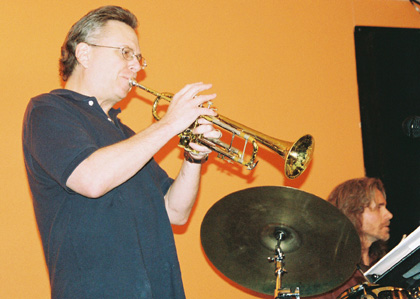 Jim Peterson |
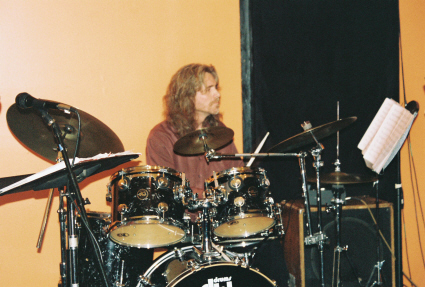 David Jennings |
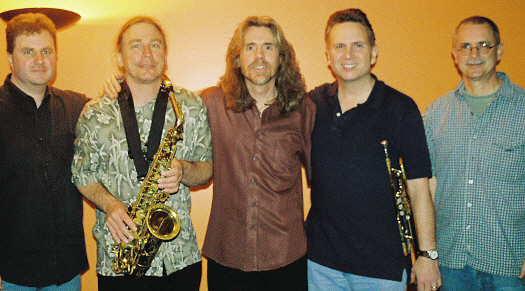 David Jennings Acoustic Ensemble |
Check out David's homepage
Check out Elastic Arts homepage